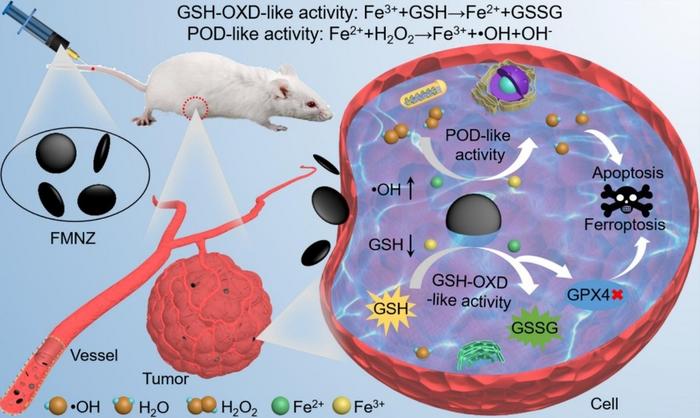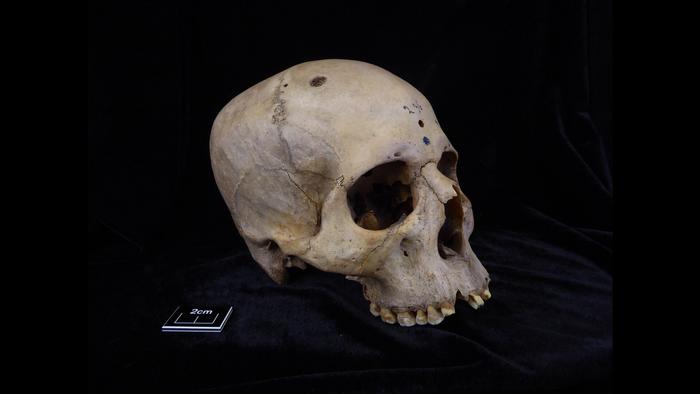Researchers Develop ‘Metal Detector’ Technology to Target Tumor Detection
In a groundbreaking development in the field of oncology, researchers have unveiled an innovative algorithm known as PRRDetect, designed to uncover vulnerable tumours by analyzing specific genetic mutations within cancer cells. This promising tool holds the potential to shift the paradigm in cancer treatment, ultimately contributing to the development of more targeted and effective therapies […]


In a groundbreaking development in the field of oncology, researchers have unveiled an innovative algorithm known as PRRDetect, designed to uncover vulnerable tumours by analyzing specific genetic mutations within cancer cells. This promising tool holds the potential to shift the paradigm in cancer treatment, ultimately contributing to the development of more targeted and effective therapies that resonate with individual patient profiles. The findings, published in the esteemed journal Nature Genetics, highlight the transformative possibilities of genomic data in tailoring cancer therapies to improve patient outcomes.
The roots of this advancement stem from extensive research conducted by a team based at the University of Cambridge and the NIHR Cambridge Biomedical Research Centre, supported by pivotal funding from Cancer Research UK and the National Institute for Health and Care Research (NIHR). Through an ambitious analysis of the complete DNA sequences of 4,775 tumours across seven distinct cancer types, this research sought to identify specific genetic faults that could indicate more treatable cancers. By leveraging the comprehensive data amassed from Genomics England’s monumental 100,000 Genomes Project, researchers crafted the PRRDetect algorithm, a novel tool poised to enhance oncological outcomes significantly.
The underlying principle of PRRDetect revolves around detecting patterns of mutations known as “indel” mutations, which encompass the insertion or deletion of base pairs within the genome. Through meticulous examination, the research team zeroed in on distinctive patterns of these indel mutations found within tumours possessing defective DNA repair mechanisms, classified as post-replicative repair dysfunction or PRRd. By discerning these patterns, researchers were able to ascertain which tumours would be more susceptible to treatments such as immunotherapy, offering hope for enhanced responses in patients with certain cancer types.
As academic and clinical realms eagerly embrace the potential of genomic sequencing, Professor Serena Nik-Zainal, who led the study and holds multiple prestigious titles at the University of Cambridge, emphasized the rapid advancement in genomic technologies. The rapid decline in sequencing costs and improvements in speed are steering the precision of cancer treatments towards a more personalized approach. The practicality of genomic sequencing becoming as commonplace as traditional imaging scans or blood tests is a looming reality, paving the way for broader and more routine utilization in clinical settings.
Cancers characterized by faulty DNA repair processes frequently exhibit a greater likelihood of positive responses to immunotherapy—a groundbreaking treatment modality that harnesses the body’s immune system to combat cancer cells. The PRRDetect algorithm functions effectively as a metaphorical “metal detector,” honing in on patients whose tumours harbor the advantageous PRRd signature, thus optimizing the precision of immunotherapeutic interventions. The potential for such advancements to personalize oncological care is immense, as it could lead to treatment plans finely tuned to the genetic nuances of each individual’s cancer.
The foundational research leading to the PRRDetect algorithm expands upon earlier efforts by Professor Nik-Zainal and her team, who conducted an “archaeological dig” of cancer genomes that unearthed previously unknown mutation patterns linked to cancer susceptibility. In this latest study, they scrutinized tumour samples with higher incidences of PRRd across a spectrum of cancers, including colorectal, brain, endometrial, skin, lung, bladder, and gastric cancers. By integrating whole genome sequences from the 100,000 Genomes Project, the research aims to dissect the complex genetic underpinnings that propel cancer development and progression.
An impressive total of 37 unique patterns of indel mutations surfaced from the investigation, revealing a complex and varied landscape of genomic alterations. Notably, ten of these patterns correlated with established risk factors for cancer, such as tobacco use and ultraviolet light exposure. Meanwhile, eight distinct patterns directly associated with PRRd opened new avenues of exploration into the interplay between genetic mutations and cancer lethality. Additionally, 19 patterns emerged that remain enigmatic, suggesting undiscovered factors contributing to carcinogenesis.
The implications of such research are profound, as Dr. Iain Foulkes, the Executive Director of Research and Innovation at Cancer Research UK, articulated. He conveyed that the era of genomic medicine is upon us, where comprehensive insights gleaned from tumour DNA can elucidate cancer initiation, proliferation, and metastasis. The advent of tools like PRRDetect signifies a monumental leap toward realizing the practical application of personalized medicine in oncology, offering hope for enhanced survival rates and improved quality of life for cancer patients.
Amidst the discussions surrounding the research, Professor Mike Lewis, the NIHR Scientific Director, underscored the significance of developing innovative therapeutic assessment tools that could improve the efficacy of cancer treatments. As cancer remains a leading cause of mortality within the UK, the potential for PRRDetect to identify therapies aligned with enhanced success rates reflects promising progress in addressing this pressing health challenge. The collaborative efforts between organizations such as Cancer Research UK and NIHR exemplify the shared commitment to advancing research that translates into tangible health improvements.
As the field of genomics continues to evolve, the insights derived from genomic analyses not only inform clinical practices but also have sweeping implications for public health strategies. Professor Matt Brown, Chief Scientific Officer at Genomics England, highlighted the critical role that genomic data play in steering predictive and preventative care measures, ultimately leading to improved outcomes for patients grappling with cancer. The development of PRRDetect stands as a testament to the monumental value of whole genome sequencing in bridging the gap between experimental research and clinical applications across diverse cancer types.
The groundbreaking study, titled “Redefined indel taxonomy reveals insights into mutational signatures,” represents a significant milestone in the ongoing quest to refine cancer treatment methodologies. As researchers continue to delve into the intricacies of cancer genomes, the aspirations for delivering personalized, evidence-based therapies are drawing nearer to realization. Ultimately, the work surrounding PRRDetect signifies a turning point in how we understand and confront the complexities of cancer, holding the promise of enhancing survival and fostering better lives for countless individuals facing this formidable adversary.
The integration of advanced genomic sequencing into clinical routines has revealed new horizons in our understanding of cancer. As we refine techniques for analyzing and interpreting genetic data, the potential for these innovations to inform treatment strategies will continue to resonate through the medical community. The work of Professor Nik-Zainal and her collaborators illustrates that the journey toward personalized medicine, powered by the treasures of genomic research, is not merely a distant goal but rather a compelling reality that beckons us forward in the ongoing battle against cancer.
Subject of Research: People
Article Title: A redefined InDel taxonomy provides insights into mutational signatures
News Publication Date: 10-Apr-2025
Web References:
References:
Image Credits:
Keywords: Cancer research, Genomic medicine, Cancer genomics, Personalized treatment, Immunotherapy, Genomic sequencing, Cancer mutations, DNA repair mechanisms, Whole genome sequencing, Tumour profiling, Cancer treatment innovation.
Tags: 000 Genomes Project100Cancer Research UK fundinggenetic mutations in cancergenomic data in cancer treatmentimproving patient outcomes in oncologyindel mutations analysispersonalized oncology solutionsPRRDetect algorithmtargeted cancer therapiestransformative cancer researchtumor detection technologyUniversity of Cambridge oncology research
What's Your Reaction?

































